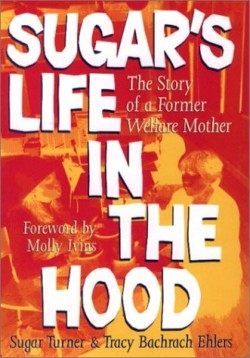Sugar's Life in the Hood
The Story of a Former Welfare Mother
The first time somebody asked me ‘Do I date?’ I was nineteen and pregnant. Still possessing a bit of childhood innocence, I did not realize the guy was trying to purchase my womanly wiles. Even after he offered me $25 and a new dress and a bag of weed, I never fully understood what he was askin’ me.
Welcome to Sugar’s world.
In her work as a cultural anthropologist, author Ehlers had done studies on Guatemalan women. In 1994, she began a project a little closer to home—examining the life of one African-American woman from across town. As she soon discovered, Sugar (a pseudonym) was no ordinary woman. Vocal and verbal, Sugar riffs and rants on her children (three of her own; two she’s raising are sons of a relative), black men, the drug subculture (she was on crack for a year and a half and is continuously—much to her chagrin—hooking up with men who are addicted in some way), the welfare system, her faith in the Lord, and her search for an identity in a world she didn’t create but in which she has to exist.
Ehlers is a professor at the University of Denver; Sugar lives in an African-American neighborhood in an unnamed Midwestern city. Her story is told in a series of taped interviews she did with Ehlers over a five-year period. Ehlers interjects field notes: “Despite her best intentions, Sugar cannot expect her boys to grow up unaffected by the world outside her doors. She reminds them daily that they are kings and arms them with a strong moral code.”
The two women ultimately progress from observer and subject to close friends; that story becomes intertwined with Sugar’s personal history. But it’s her own continuing saga that makes Sugar a survivor. Always a good student, she abandoned any dreams of further education when she became pregnant and married at age eighteen. There was another baby, but the marriage was already over.
She was on and off welfare for seventeen years, but always out there hustling—getting more where she could in order to subsist. Despite brief brushes with drugs and prostitution, Sugar is optimistic and strong in her convictions. She’s pessimistic, however, about the search for a black man who can be a father figure to her kids and a good, decent husband to her.
She realizes she’s got parts of the dream, as she admonishes herself: “You got some pie. You \\\ betta be glad.“
Disclosure: This article is not an endorsement, but a review. The publisher of this book provided free copies of the book to have their book reviewed by a professional reviewer. No fee was paid by the publisher for this review. Foreword Reviews only recommends books that we love. Foreword Magazine, Inc. is disclosing this in accordance with the Federal Trade Commission’s 16 CFR, Part 255.

